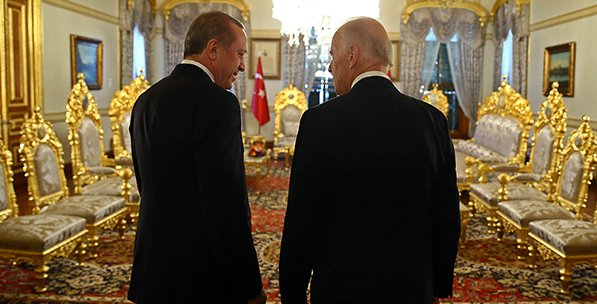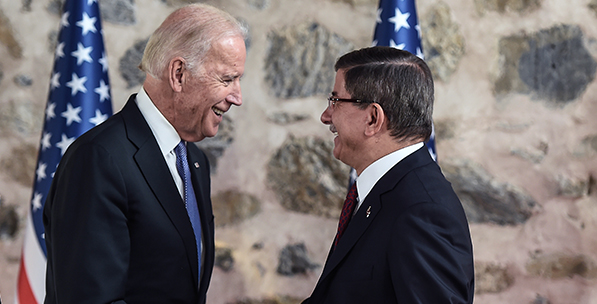VİDEO LİNK :
www.youtube.com/watch?v=hqLsGPKo_Gk&list=TLGGH2TuAruZSa8wNzA2MjAxNw


In a column a few weeks ago regarding the Insight Turkey Annual Conference, I gave a synopsis of the debate among the participants of a panel on Turkish-U.S. relations. Responding to a question on the panel about the possible “spoiler” of Turkish -US relations in 2016, there was a consensus among the panelists on the possible negative impact on bilateral ties by the Democratic Union Party’s (PYD) armed People’s Protection Units (YPG) in Syria. This issue has been negatively affecting the relationship between Turkey and Syria, especially over the last two years. Other than the immediate impact stemming from the publicity this disagreement involves, there is also the long-term problem that this tension is generating for mutual trust between the two countries. This is not the first time PKK-related issues have caused problems in bilateral relations. In the immediate aftermath of the U.S. invasion of Iraq, Ankara and Washington experienced tensions in bilateral relations because of the lack of satisfactory U.S. action against PKK targets. Increasing PKK activity and disagreement between Turkey and the U.S. during this period generated significant tension, while the difference between the two countries regarding the PYD and YPG started to create a more serious disagreement, deteriorating relations especially during the siege of Kobani. The fact that some U.S. officials publicly criticized Ankara for not doing enough in Kobani, and the fact that the U.S., despite opposition from Ankara, airdropped weapons to the YPG added to this crisis. For Ankara, the operational cooperation and membership overlap between the YPG and PKK make the two organizations one and the same. This overlap and cooperation could generate a major security risk for Turkey by increasing the capabilities of the PKK on the ground. There was already some concern within the Turkish security establishment about the PKK’s unwillingness to pull its forces out of Turkey during the cease-fire period. The U.S. assistance to the YPG in this period both legitimized and emboldened the organization in the region. After the sudden termination of the cease-fire agreement, the PKK demonstrated that some of Turkey’s concerns regarding the increasing sophistication of PKK operations were well-founded. Since then, the U.S. has stepped up its support for the YPG and Ankara has continued to express its concern meaning the discord between two countries continues to test their bilateral ties. In the meantime, Turkey faced a series of PKK attacks in southeastern cities and challenges to public order from its affiliated organizations. Since then, Turkey launched a major offensive against PKK targets. Operations against DAESH also intensified during this period. At this critical juncture, Ankara is facing two separate terrorist threats from two different organizations. While pursuing and intensifying the crackdown on these groups in Turkey, Ankara is also taking precautions to stop any form of infiltration by the members of these groups from Syria and Iraq into the country. On this point at least, there is not much difference of opinion between Turkey and US on how to fight DAESH with operational cooperation and coordination in border security arrangements between the two countries. Nevertheless, Ankara insists that the main problem is the state of affairs that Syrian President Bashar Assad’s regime has generated and that a solution in Syria is necessary to resolve the widening regional crisis. What is more, the distinction that Washington claims to exist between the PKK and YPG is a problem to Turkish-U.S. relations. Washington seemed to recognize the concerns Ankara has conveyed about the YPG sufficiently enough to avoid them becoming a threat to Turkey, but there are serious concerns regarding operational cooperation, exchange of knowhow and membership overlap between the PKK and YPG. It will take stronger precautions to convince Ankara on the safety of American policy, and in the absence of such measures the issue will continue to be a spoiler for the two countries’ relations. It can be expected that debates about the airfield in northern Syria will also be part of discussions in the coming weeks. [Daily Sabah, January 25, 2016] |


In the past week, undoubtedly one of the most important matters on the agenda of Turkish politics was U.S. Vice President Joe Biden’s visit. Above all else, Biden’s visit was important in terms of evaluating the potential for collaboration between the U.S. and Turkey on Middle Eastern politics in general and, more specifically, on Syria and Iraq, as well as negotiations regarding the various differences of opinion. Discussions on what Biden might have in his dossier had already begun before he arrived. The general idea was that Biden and Turkish officials would discuss the topics of the struggle with DAESH, Turkish-Russian relations, the status of the Democratic Union Party (PYD), the structure of the Bashiqa camp, border security and a new train-and-equip program. Indeed, Biden came and met first with Prime Minister Ahmet Davutoğlu and President Recep Tayyip Erdoğan to speak about these topics.However, the other factor that made Biden’s visit interesting and media-focused was the frequency of his visits. Biden only met with the radical opposition, where opposition to Erdoğan is at the center of political discourse, causing many debates. The journalists who attended these meetings gleefully chose to interpret this as a victory won over Erdoğan. The fact that Biden drew attention to the freedom of the press and the freedom of expression in this meeting, where he stressed the message that there must not be capitulations on the freedoms of the press and expression, is significant. Notably, the political message behind Biden’s sole acceptance of journalists who oppose Erdoğan as his respondents is obvious. Biden and American decision makers are aware of the administrative fight ongoing in Turkish politics as well as how this fight is reflected in the media. The socio-political opposition representatives Biden met with are those who have made their opposition to Erdoğan an identity, even an obsession. They include those who supported, whether openly or clandestinely, the Gezi protests, the Dec. 17 and Dec. 25 coup attempts on the part of the Gülen Movement and, later, regarding the new struggle instigated by the PKK terror organization against the state for the purpose of bringing Erdoğan’s administration down. Under the headlines of "the freedom of the press" and freedom of expression, at the center of the invisible political struggle therein lies the obstruction of political normalization and the transformation that is occurring with Erdoğan’s leadership. This naked truth is a situation known quite well by the actors who know and recognize Turkey. Of course, Biden and those who arranged his program know this quite well, too. So, why did Biden lean toward such a symbolic stance against Erdoğan’s? The reason for this is not the U.S.’s supposed keen interest in Turkey’s problems regarding the freedom of the press. U.S.-Turkish relations have a long past, and modern Turkish history is full of incomparably heavy obstacles to the freedom of expression and the press when compared to today. Within this historical process, we all know that the U.S. did not engage in symbolic intervention in Turkey through rhetoric advocating for the freedom of expression. Another thing we know is that, for the U.S., when its own national interests are the point in question, the U.S. throws the topics of freedom of expression and freedom of the press out the window. However, what is more important is that the U.S. uses the rhetoric of freedom of expression and the freedom of the press in its foreign policy processes in countries that U.S. officials want to convince to take a certain position or to impose a new situation. Then, in this case, what is the new position that the U.S. wants to convince Turkey of or that the U.S. wants to impose on Turkey? The U.S.’s main concern is making Turkey more influential in the struggle against DAESH. At this point, the U.S. is asking that Turkey take on much more responsibility in that regard. Despite the fact that Turkey considers DAESH a terrorist organization and is fighting DAESH both inside and outside the country, the U.S. is still asking that Turkey contribute much more. The most fundamental issue for the U.S. is that Turkey regards DAESH as the upmost threat and must mobilize its military capacity against it. Another dimension is that, from the U.S.’s perspective, Turkey should not regard the PYD and its armed People’s Protection Units (YPG), which the U.S. sees as the primary ground forces used in the struggle against DAESH, as a threat. Ankara’s main point of concern during this process has been that the PYD is the PKK’s extension in Syria and the guns given to the PYD and YPG are being used in PKK terror attacks in Turkey. Davutoğlu and Erdoğan both clearly explained Turkey’s approach to the PKK and the PYD in their meetings with Biden. In response, Biden reaffirmed that the PKK is a terror organization like DAESH; however, the U.S. will work together with the PYD. There is a crucial point that American decision makers must realize. The more successful Turkey is in its struggle against the PKK, the more likely it is to successfully fight against DAESH. During this period, it is paramount to stop giving the PYD, also known as the PKK’s Syrian extension, various tactical realities and privileged positions. U.S. foreign policy makers must stop strangling strategy with tactics. [Daily Sabah, January 29, 2016] |